Thinking Functionally In Ruby
- 1. THINKING FUNCTIONALLY IN RUBY. @tomstuart
- 2. 1: Functional programming is a pretty neat idea.
- 3. 2: Enumerable contains some useful methods.
- 4. I hope these things are connected.
- 5. 1. (Functional programming is a pretty neat idea)
- 6. What is functional programming?
- 9. • Scheme • Common Lisp • Dylan • Clojure 1. Lisp-like • Dynamically typed • Homoiconic (code is data) • Lists are fundamental
- 10. • Standard ML • Haskell • OCaml • Scala (sort of) 2. ML-like • Statically typed (+ reconstruction) • Code is not data • ADTs and pattern matching
- 16. 1 2 7 6 2 3 3 6 1 7 5 4 8 4
- 18. “First-class functions” “closures”, “lambdas”, “anonymous functions” Implies: higher-order functions
- 19. No side effects
- 20. Values are immutable All functions do is return their result No state No I/O
- 21. (In reality, different languages accomplish this to varying degrees.)
- 22. Implies: recursion Implies: persistent data structues
- 23. So what?
- 24. Unfortunately...
- 25. Declarative T! W HA programming is counterintuitive when youʼre accustomed to imperative HOW ! programming
- 27. But!
- 28. Referential transparency “an expression can be replaced with its value” • Good for efficiency • caching/memoisation/inlining • ultimately more efficient • Good for programmer understanding • state is incredibly hard to deal with • ultimately more intuitive • Good for code reuse and testing
- 29. Highly expressive Strongly compositional Deeply satisfying
- 30. Future-proof • Mooreʼs Law is running out of steam • similar transistor density, more cores • The futureʼs concurrent • Concurrent access to mutable state is hard... • but not if you donʼt have mutable state! • Parallelising an algorithm is hard... • but itʼs easier if your code isnʼt overspecified
- 31. OK seriously: so what?
- 32. Ruby can do some of this. Not really a functional language, but we can pretend and get some of the benefits.
- 33. Use function values blocks, procs lambda { |x| x + 1 }
- 34. Consider treating your values as immutable State is rarely worth it. It will kill you in the end.
- 36. Use the functional-flavoured parts of the standard library
- 37. Think functionally. Be declarative. What, not how.
- 38. 2. (Enumerable contains some useful methods)
- 39. Enumerable#zip
- 40. [1, 2, 3, 4]. zip([5, 6, 7, 8])
- 41. 1 2 3 4 5 6 7 8
- 42. 1 5 2 6 3 7 4 8
- 43. [ ] [1 , 5],[2 , 6],[3 , 7],[4 , 8]
- 44. [1, 2, 3, 4]. zip([5, 6, 7, 8], [9, 10, 11, 12])
- 46. { |x| x.odd? }
- 47. 1 ?
- 48. 1 ! ? 1
- 49. 1 2 ! ? 1 ?
- 50. 1 2 ! ? 1 " ? 2
- 51. [1, 2, 3, 4]. select { |x| x.odd? }
- 52. 1 2 3 4 ? ? ? ?
- 53. 1 2 3 4 ! ? 1 " ? 2 ! ? 3 " ? 4
- 54. 1 3 ! ? 1 ! ? 3 1 3
- 55. [ 1, 3 ]
- 57. [1, 2, 3, 4]. partition { |x| x.odd? }
- 58. 1 2 3 4 ? ? ? ?
- 59. 1 2 3 4 ! ? 1 " ? 2 ! ? 3 " ? 4
- 60. 1 3 2 4 ! ? ! ? " ? " ?
- 61. 1 3 2 4 ! ? ! ? " ? " ? 1 3 2 4
- 62. [[ 1 , 3 ] , [ 2 , 4 ]]
- 64. { |x| x * 3 }
- 65. 2 ×3 6
- 66. 2 ×3 2 6
- 67. [1, 2, 3, 4]. map { |x| x * 3 }
- 68. 1 2 3 4 ×3 3 ×3 6 ×3 9 ×3 12
- 69. 1 2 3 4 ×3 1 ×3 2 ×3 3 ×3 4 3 6 9 12
- 70. [ , , , ] 3 6 9 12
- 71. Enumerable#inject (a.k.a. #reduce)
- 72. { |x, y| x + y }
- 73. 3 5 8 +
- 74. 3 5 3+5 8
- 75. [1, 2, 3, 4]. inject(0) { |x,y| x+y }
- 76. 0 1 1 + 2 3 + 3 6 + 4 + 10
- 77. 0 1 0+1 1 2 1+2 3 3 3+3 6 4 6 + 4 10
- 78. module Enumerable def inject(initial) result = initial for element in self result = yield(result, element) end result end end
- 79. a.k.a. “left fold” (foldl, fold_left)
- 80. 0 1 2 3 4
- 81. 10 (((0 + 1) + 2) + 3) + 4
- 82. ...versus “right fold” (foldr, fold_right)
- 83. 1 2 3 4 0
- 84. 10 1 + (2 + (3 + (4 + 0)))
- 85. The initial argument is optional...
- 86. [1, 2, 3, 4]. inject { |x,y| x+y }
- 87. [2, 3, 4].4]. [1, 2, 3, inject(1)|x,y| x+yx+y } inject { { |x,y| }
- 88. ...but only if the output is the same type as the input...
- 89. >> ['El', 'rug']. inject(0) { |l,s| l + s.length } => 5 >> ['El', 'rug']. inject { |l,s| l + s.length } TypeError: can't convert Fixnum into String from (irb):1:in `+' from (irb):1 from (irb):1:in `inject' from (irb):1:in `each' from (irb):1:in `inject' from (irb):1
- 90. ...and itʼs meaningful to get nil when the collection is empty
- 91. >> [].inject { |x,y| x+y } => nil >> [].inject(0) { |x,y| x+y } => 0 >> [].inject(1) { |x,y| x*y } => 1
- 92. P O SE ! C O M
- 93. [1, 2, 3, 4]. map { |x| x * 3 }. inject(0) { |x| x+y }
- 94. 1 2 3 4 ×3 3 ×3 6 ×3 9 ×3 12 0 3 + 9 + + 18 + 30
- 95. 1 2 3 4 ×3 1 ×3 2 ×3 3 ×3 4 0 3 0+3 3 6 3+6 9 9 9 + 9 18 12 18+12 30
- 96. I am so excited. What now?
- 97. Review your Ruby code. Func it up.
- 98. result = '' for name in names unless result.empty? result << ', ' end result << name end result
- 99. ! result = '' for name in names unless result.empty? result << ', ' end result << name end result names.join(', ')
- 100. def count_mines_near(x, y) count = 0 for i in x-1..x+1 for j in y-1..y+1 count += 1 if mine_at?(i, j) end end count end
- 101. ! def count_mines_near(x, y) count = 0 for i in x-1..x+1 for j in y-1..y+1 count += 1 if mine_at?(i, j) end end count end def count_mines_near(x, y) ((x-1..x+1).entries * 3).sort. zip((y-1..y+1).entries * 3). select { |x, y| mine_at?(x, y) }. length end
- 102. [1, 2, 3, 1, 2, 3, 1, 2, 3].sort = [1, 1, 1, 2, 2, 2, 3, 3, 3] def count_mines_near(x, y) # = (2, 8) ((x-1..x+1).entries * 3).sort. zip((y-1..y+1).entries * 3). select { |x, y| mine_at?(x, y) }. length end
- 103. [1, 2, 3, 1, 2, 3, 1, 2, 3].sort = [1, 1, 1, 2, 2, 2, 3, 3, 3].zip( [7, 8, 9, 7, 8, 9, 7, 8, 9]) = [[1, 7], [1, 8], [1, 9], [2, 7], [2, 8], [2, 9], [3, 7], [3, 8], [3, 9]] def count_mines_near(x, y) # = (2, 8) ((x-1..x+1).entries * 3).sort. zip((y-1..y+1).entries * 3). select { |x, y| mine_at?(x, y) }. length end
- 104. [1, 2, 3, 1, 2, 3, 1, 2, 3].sort = [1, 1, 1, 2, 2, 2, 3, 3, 3].zip( [7, 8, 9, 7, 8, 9, 7, 8, 9]) = [[1, 7], [1, 8], [1, 9], [2, 7], [2, 8], [2, 9], [3, 7], [3, 8], [3, 9]].select {…} = [[1, 8], [3, 7]].length = 2 def count_mines_near(x, y) # = (2, 8) ((x-1..x+1).entries * 3).sort. zip((y-1..y+1).entries * 3). select { |x, y| mine_at?(x, y) }. length end
- 105. [ [1, 7], [1, 8], …, [1, 1007], [2, 7], [2, 8], …, [2, 1007], …, …, …, [1000, 7], [1000, 8], …, [1000, 1007], [1001, 7], [1000, 8], …, [1001, 1007]] def count_mines_near(x, y) ((x-500..x+500).entries * 1001).sort. zip((y-500..y+500).entries * 1001). select { |x, y| mine_at?(x, y) }. length end
- 106. [ [1, 7], [1, 8], …, [1, 1007], [2, 7], [2, 8], …, [2, 1007], …, …, …, [1000, 7], [1000, 8], …, [1000, 1007], [1001, 7], [1000, 8], …, [1001, 1007]] 173 96 121 78 237 705
- 107. def numbers_near(n, radius) ((n - radius)..(n + radius)).entries end def squares_near(x, y, radius) diameter = (radius * 2) + 1 (numbers_near(x, radius) * diameter). sort. zip(numbers_near(y, radius) * diameter) end def count_mines_near(x, y, radius = 1) squares_near(x, y, radius). select { |x, y| mine_at?(x, y) }. length end
- 108. Learn a functional language • OCaml • Scheme (Google “SICP”) • Clojure • Scala • Haskell? Erlang?

























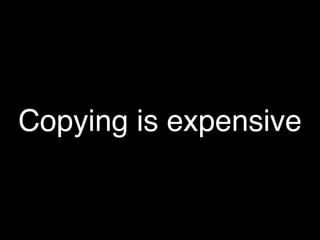











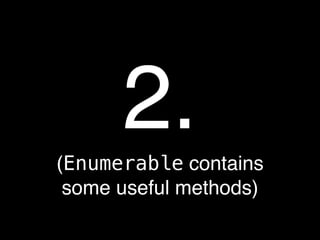

![[1, 2, 3, 4].
zip([5, 6, 7, 8])](https://image.slidesharecdn.com/thinking-functionally-in-ruby-091016082812-phpapp02/85/Thinking-Functionally-In-Ruby-40-320.jpg)


![[ ]
[1 , 5],[2 , 6],[3 , 7],[4 , 8]](https://image.slidesharecdn.com/thinking-functionally-in-ruby-091016082812-phpapp02/85/Thinking-Functionally-In-Ruby-43-320.jpg)
![[1, 2, 3, 4].
zip([5, 6, 7, 8],
[9, 10, 11, 12])](https://image.slidesharecdn.com/thinking-functionally-in-ruby-091016082812-phpapp02/85/Thinking-Functionally-In-Ruby-44-320.jpg)






![[1, 2, 3, 4].
select { |x| x.odd? }](https://image.slidesharecdn.com/thinking-functionally-in-ruby-091016082812-phpapp02/85/Thinking-Functionally-In-Ruby-51-320.jpg)



![[ 1, 3 ]](https://image.slidesharecdn.com/thinking-functionally-in-ruby-091016082812-phpapp02/85/Thinking-Functionally-In-Ruby-55-320.jpg)

![[1, 2, 3, 4].
partition { |x| x.odd? }](https://image.slidesharecdn.com/thinking-functionally-in-ruby-091016082812-phpapp02/85/Thinking-Functionally-In-Ruby-57-320.jpg)




![[[ 1 , 3 ] , [ 2 , 4 ]]](https://image.slidesharecdn.com/thinking-functionally-in-ruby-091016082812-phpapp02/85/Thinking-Functionally-In-Ruby-62-320.jpg)




![[1, 2, 3, 4].
map { |x| x * 3 }](https://image.slidesharecdn.com/thinking-functionally-in-ruby-091016082812-phpapp02/85/Thinking-Functionally-In-Ruby-67-320.jpg)


![[ , , , ]
3 6 9 12](https://image.slidesharecdn.com/thinking-functionally-in-ruby-091016082812-phpapp02/85/Thinking-Functionally-In-Ruby-70-320.jpg)




![[1, 2, 3, 4].
inject(0) { |x,y| x+y }](https://image.slidesharecdn.com/thinking-functionally-in-ruby-091016082812-phpapp02/85/Thinking-Functionally-In-Ruby-75-320.jpg)
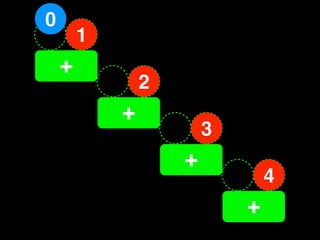

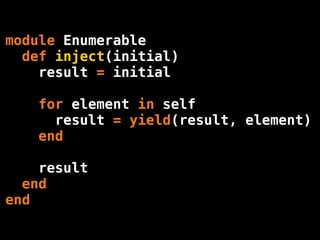



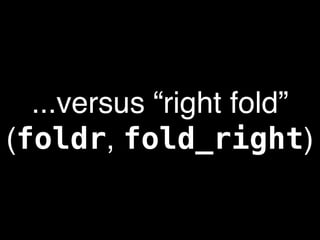



![[1, 2, 3, 4].
inject { |x,y| x+y }](https://image.slidesharecdn.com/thinking-functionally-in-ruby-091016082812-phpapp02/85/Thinking-Functionally-In-Ruby-86-320.jpg)
![[2, 3, 4].4].
[1, 2, 3,
inject(1)|x,y| x+yx+y }
inject { { |x,y| }](https://image.slidesharecdn.com/thinking-functionally-in-ruby-091016082812-phpapp02/85/Thinking-Functionally-In-Ruby-87-320.jpg)

![>> ['El', 'rug'].
inject(0) { |l,s| l + s.length }
=> 5
>> ['El', 'rug'].
inject { |l,s| l + s.length }
TypeError: can't convert Fixnum into String
from (irb):1:in `+'
from (irb):1
from (irb):1:in `inject'
from (irb):1:in `each'
from (irb):1:in `inject'
from (irb):1](https://image.slidesharecdn.com/thinking-functionally-in-ruby-091016082812-phpapp02/85/Thinking-Functionally-In-Ruby-89-320.jpg)

![>> [].inject { |x,y| x+y }
=> nil
>> [].inject(0) { |x,y| x+y }
=> 0
>> [].inject(1) { |x,y| x*y }
=> 1](https://image.slidesharecdn.com/thinking-functionally-in-ruby-091016082812-phpapp02/85/Thinking-Functionally-In-Ruby-91-320.jpg)

![[1, 2, 3, 4].
map { |x| x * 3 }.
inject(0) { |x| x+y }](https://image.slidesharecdn.com/thinking-functionally-in-ruby-091016082812-phpapp02/85/Thinking-Functionally-In-Ruby-93-320.jpg)








![[1, 2, 3, 1, 2, 3, 1, 2, 3].sort =
[1, 1, 1, 2, 2, 2, 3, 3, 3]
def count_mines_near(x, y) # = (2, 8)
((x-1..x+1).entries * 3).sort.
zip((y-1..y+1).entries * 3).
select { |x, y| mine_at?(x, y) }.
length
end](https://image.slidesharecdn.com/thinking-functionally-in-ruby-091016082812-phpapp02/85/Thinking-Functionally-In-Ruby-102-320.jpg)
![[1, 2, 3, 1, 2, 3, 1, 2, 3].sort =
[1, 1, 1, 2, 2, 2, 3, 3, 3].zip(
[7, 8, 9, 7, 8, 9, 7, 8, 9]) =
[[1, 7], [1, 8], [1, 9],
[2, 7], [2, 8], [2, 9],
[3, 7], [3, 8], [3, 9]]
def count_mines_near(x, y) # = (2, 8)
((x-1..x+1).entries * 3).sort.
zip((y-1..y+1).entries * 3).
select { |x, y| mine_at?(x, y) }.
length
end](https://image.slidesharecdn.com/thinking-functionally-in-ruby-091016082812-phpapp02/85/Thinking-Functionally-In-Ruby-103-320.jpg)
![[1, 2, 3, 1, 2, 3, 1, 2, 3].sort =
[1, 1, 1, 2, 2, 2, 3, 3, 3].zip(
[7, 8, 9, 7, 8, 9, 7, 8, 9]) =
[[1, 7], [1, 8], [1, 9],
[2, 7], [2, 8], [2, 9],
[3, 7], [3, 8], [3, 9]].select {…} =
[[1, 8], [3, 7]].length = 2
def count_mines_near(x, y) # = (2, 8)
((x-1..x+1).entries * 3).sort.
zip((y-1..y+1).entries * 3).
select { |x, y| mine_at?(x, y) }.
length
end](https://image.slidesharecdn.com/thinking-functionally-in-ruby-091016082812-phpapp02/85/Thinking-Functionally-In-Ruby-104-320.jpg)
![[ [1, 7], [1, 8], …, [1, 1007],
[2, 7], [2, 8], …, [2, 1007],
…, …, …,
[1000, 7], [1000, 8], …, [1000, 1007],
[1001, 7], [1000, 8], …, [1001, 1007]]
def count_mines_near(x, y)
((x-500..x+500).entries * 1001).sort.
zip((y-500..y+500).entries * 1001).
select { |x, y| mine_at?(x, y) }.
length
end](https://image.slidesharecdn.com/thinking-functionally-in-ruby-091016082812-phpapp02/85/Thinking-Functionally-In-Ruby-105-320.jpg)
![[ [1, 7], [1, 8], …, [1, 1007],
[2, 7], [2, 8], …, [2, 1007],
…, …, …,
[1000, 7], [1000, 8], …, [1000, 1007],
[1001, 7], [1000, 8], …, [1001, 1007]]
173 96 121 78 237
705](https://image.slidesharecdn.com/thinking-functionally-in-ruby-091016082812-phpapp02/85/Thinking-Functionally-In-Ruby-106-320.jpg)



